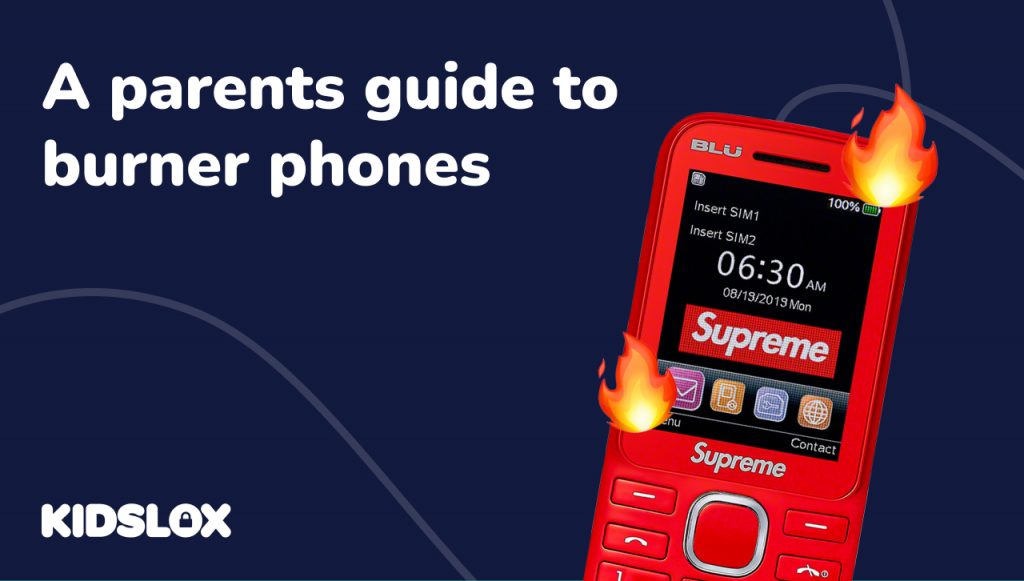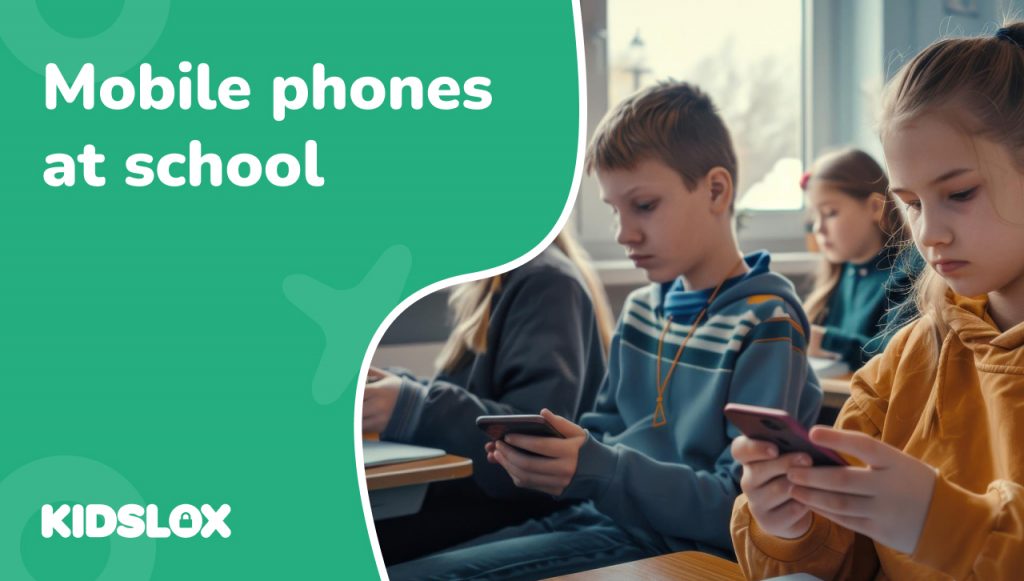So, you’ve finally given in to your teen’s constant asking for a phone. After all, with so many school activities, friend hangouts, and extracurricular commitments, it seems like a reasonable way to stay connected and keep tabs on their whereabouts.
You’ve bought a phone, added parental controls to keep them safe online, and even had the “safety talk” with them to encourage them to use it responsibly.
But recently, a fellow parent told you about their child having a “burner phone” to get around screen time limits and parental controls, and now you’re worried your teen might be doing the same.
If you’re wondering, “What is a burner phone? Why would my child have one?” you’re not alone. Many parents are grappling with this new challenge as children and teens try to work around parental controls and security to use their phones more freely.
While the risks of teen burner phones may be a bit different from the pop culture “burner phone” concept, the idea is the same: a phone that is not linked to a specific person and can be used without being traced back to them. This means teens can use these phones to access content, apps, and other online activities they may not have permission for on their regular devices.
But why do teens feel the need to have burner phones in the first place? Let’s explore the concept of burner phones, diving into what they are, how they work, and why kids might be tempted to use them.
More importantly, we’ll provide practical tips and strategies for addressing this issue with your teen, fostering open communication, and ultimately building a relationship of trust and understanding.
What Is A Burner Phone?
A burner phone, also known as a disposable or temporary phone, is a mobile device that is used for a short period and then discarded. The term “burner” comes from the idea of buying a cheap, prepaid phone, using it for a while, and then “burning” or disposing of it to avoid any traces of the user’s identity or activity.
Traditionally, burner phones were associated with criminal activities, as they allowed individuals to communicate anonymously and avoid detection. Think of crime shows, with thugs throwing away their phones after making a shady deal. More recently, this idea has become mainstream and is now commonly used by everyday individuals for a variety of reasons.
When it comes to teens, a “burner phone” often refers to a secondary phone that a child uses to bypass the restrictions and monitoring set up on their primary device. This could be an old phone they’ve acquired from a friend or family member, a cheap prepaid phone purchased with cash, or even a virtual phone number accessed through a burner phone app.
Burner Phone Apps: A New Twist on an Old Concept
With the rise of smartphones and mobile applications, burner phones have taken on a new form in the digital age. Burner phone apps, such as Burner, Hushed, and CoverMe, allow users to create temporary, disposable phone numbers that can be used for calls, texts, and even some online services.
These apps often market themselves as tools for privacy, offering features like encrypted communication and auto-deletion of messages. However, teens can also use them to create alternate phone numbers that their parents are unaware of, allowing them to communicate with friends or access online content without supervision.
Why Do Teens Use Burner Phones?
So, why would a teen want to locate and use a burner phone in the first place? Is it always for dangerous purposes – or is it more a case of curiosity?
Circumventing Parental Controls and Screen Time Limits
One of the most common reasons teens use burner phones is to get around the rules and restrictions set by their parents.
If a teen feels that the screen time limits or app restrictions on their primary phone are too strict, they may seek out a burner phone to use without their parent’s knowledge. This allows them to access content, apps, and social media platforms that they may not be allowed to use on their main device.
Privacy Concerns
As teens navigate the challenges of growing up, they may become increasingly protective of their privacy. Some teens may turn to burner phones to communicate with friends or explore online content without fearing their parents or others monitoring their activity.
While the desire for privacy is a normal part of adolescent development, parents must maintain open communication and provide guidance on responsible phone use.
Peer Pressure and Social Trends
Sometimes, teens may feel pressure from their friends or classmates to have a burner phone. If their peers use these devices to communicate or access certain apps, a teen may feel compelled to follow suit to fit in or avoid being left out. Using burner phones may be seen as a “trendy” or “cool” thing among certain social circles.
Exploring Identity and Independence
As teens work to establish their own identities and assert their independence, they may view burner phones as a way to experiment with different aspects of their personality or interests without the watchful eye of their parents.
For example, a teen may use a burner phone to explore online communities or express themselves in ways they feel they can’t on their main device. They may also look to burner phones to keep certain aspects of their life private from their parents, such as communication with friends or romantic partners.
What Are The Risks of Burner Phones & Kids?
While it’s important to understand the reasons why teens might use burner phones, it’s equally crucial for parents to be aware of the potential risks associated with these devices. By recognizing these risks, parents can take steps to protect their children and guide them toward safer, more responsible phone use.
Potential for Unsafe or Inappropriate Communication
One of the primary risks of burner phones is the potential for teens to engage in unsafe or inappropriate communication.
Remember, without oversight, teens may be more likely to communicate with strangers online, share personal information, or engage in conversations that are sexual or otherwise inappropriate for their age. This can put them at risk of online predators, cyberbullying, or exposure to harmful content.
Difficulty Monitoring Child’s Phone Usage
When a teen uses a burner phone, it can be challenging for parents to monitor their child’s phone activity effectively.
Without access to the device or knowledge of the phone number, parents may struggle to keep tabs on who their child is communicating with, what apps they are using, and how much time they spend on the phone. This lack of visibility can make it harder for parents to identify potential issues or intervene when necessary.
Exposure to Online Threats
Burner phones can also increase a teen’s exposure to various online threats, such as scams, malware, and phishing attempts.
A lack of security measures and parental controls on a primary device can leave teens more vulnerable to these risks when using a burner phone. They may unknowingly download malicious apps, click on harmful links, or share sensitive information with cybercriminals posing as trustworthy sources.
Hindrance to Building Trust and Communication
Using a burner phone can also strain the trust and communication between parents and teens.
When a teen feels the need to hide their phone activity or use a secret device, it can create a sense of secrecy and disconnection within the family. This lack of transparency can make it harder for parents to provide guidance and support and may lead to further rebellion or risk-taking behavior from the teen.
Navigating the Topic of Burner Phones With Teens
As a parent, discovering that your teen is using a burner phone can be a challenging and concerning situation. But if you can approach the issue with empathy, open communication, and a focus on building trust and protection, you can help them navigate this complex topic and make responsible choices online.
Open Communication with Your Child
The first step in addressing the burner phone issue is to have an open, honest conversation with your teen. Approach the topic with curiosity and understanding rather than accusations or anger.
Ask your child about their reasons for using a burner phone and listen to their perspective without judgment. By creating a safe space for dialogue, you can better understand your teen’s needs and work together to find solutions.
Establish Clear Boundaries and Expectations
Once you’ve had an initial conversation, work with your teen to establish clear boundaries and expectations around phone use.
These may include setting agreed-upon screen time limits, defining approved apps and websites, and outlining consequences for breaking the rules. Be sure to involve your child in the process, allowing them to have input and take ownership of the guidelines you create together.
Educate Your Child About Online Safety
One of the most effective ways to protect your teen online is to educate them about potential risks and how to stay safe. Discuss online privacy, cyberbullying, and the importance of protecting personal information.
But more than that, work to encourage your child to come to you with any concerns or questions they may have and provide them with resources and tools to help them navigate the digital world safely.
Consider Parental Control Options
While open communication and education are essential, there may be situations where additional monitoring or control measures are necessary. Consider using built-in parental controls on your child’s primary device or exploring third-party monitoring apps that can help you keep tabs on their online activity. However, be sure to discuss these measures with your teen and explain your reasoning behind them, emphasizing that the goal is to ensure their safety, not to invade their privacy.
Model Responsible Phone Use
As a parent, it’s important to lead by example when it comes to phone use and online behavior.
Model the responsible habits you want to see in your child, such as setting aside phone-free time, being mindful of screen time, and engaging in face-to-face communication. Demonstrating healthy phone habits yourself can create a positive influence and reinforce the guidelines you’ve established with your teen.
Remember, building trust and protection around phone use is an ongoing process. Keep the lines of communication open, be willing to adapt your approach as your child grows and matures, and prioritize your relationship with your teen above all else.
You Play A Key Role In Keeping Kids Safe
Burner phones are just one of many tech-related issues facing children and teens in a digital-first world. Fortunately, by staying engaged and informed about what our kids are doing online, parents and guardians can help avoid any potential dangers – while building trusting relationships.
If you find that your teen is struggling with excessive phone use, exhibiting signs of anxiety or depression, or engaging in risky online behaviors, it may be time to seek professional help. A trained therapist or counselor can provide valuable guidance and support, helping your child work through any underlying issues and develop healthy coping mechanisms.
Remember, parenting in the digital age is a learning process for everyone involved. By staying informed, maintaining open communication, and prioritizing your child’s safety and emotional well-being, you can help them navigate the complexities of growing up in a tech-saturated world.
Want to learn more about this and many other tech-related topics? Check out the informative blogs and articles on Kidslox – your go-to guide for tips, insights, and resources on parental controls, screen time management, and fostering healthy digital habits!





